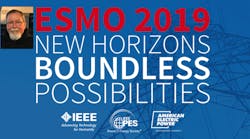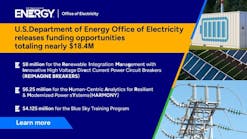Throughout the utility industry, companies are using drones for line inspections and storm response. To learn more about this technology, register for ESMO 2019, which is sponsored by IEEE PES and hosted by American Electric Power.
Alan Holloman, vice president of operations at Power Grid Resources, Inc. is leading a panel during the technical session on drones and line inspections and towers and foundations. Here is a look at his session, which will be presented at ESMO 2019 in June in Columbus, Ohio.
Q: What are some benefits of attending ESMO 2019 for power industry professionals?
A: The IEEE ESMO present a unique opportunity for power industry professionals to come together in a location where they can:
- listen to presentations on industry practices and issues.
- attend the general IEEE meeting and learn about topics that affect the industry in areas of safety, maintenance and general operations.
- browse the indoor trade show at the convention center.
- visit the outdoor exhibits on a variety of services.
- have side discussions with your peers around a cup of coffee or snack discussing particular issues.
Q: Your company, Power Grid Resources, has been actively involved with IEEE. Why did you decide to join a panel discussion at ESMO 2019?
A: I had been involved to a lesser degree with IEEE since 1986 and to a greater degree in the 1990s. Being a part of IEEE ESMOL allowed me to work with a great group of industry professionals with a wealth of knowledge on pressing issues faced by the industry. This group was working on many standards and papers that focused on the safety of the workers and processes to increase the system's reliability. I was the beneficiary of some earlier ESMO sessions and feel honored to participate as a session chair. I hope the session will help the industry participants.
Q: You are leading a session on drones and line inspections as well as tower and foundations. What are you planning to cover?
A: Here is what I plan to include in my session.
- Drones and Line Inspection
- Utilities are always looking for new processes to perform different maintenance and construction activities. When drones started being looked at in the industry, many questions were being bounced around on the capabilities of the unmanned aerial systems. A lot of pilot programs and research has taken place as well as many unique detailed inspections been performed with their use. The panel will present on many areas of research and uses.
- Tower and Foundations
- The electrical grid is supported by wood, steel and concrete structures. Wood pole inspections have been the norm for many years. However, over the last few years, a greater emphasis has been put steel and foundation inspections as well as maintenance processes and programs. We will have presentations on specific utility programs and issues related to steel and foundation remediation.
Q: How are energy companies using drones today in the field, and how does this technology improve productivity for crews?
A: Some utilities are using drones to perform some degree of inspections. These could relate to inventory, looking for defects and even specialized inspections such as corona or IR inspections. There are also other areas where drones may be useful such as a tool to position a fall protection line for first man up with a fall protection program.
Q: How did you get interested in a career in the utility industry?
A: At 18 years of age, I went to work with Georgia Power Company on a traveling construction transmission line crew. I was fortunate to be on a crew with some very good seasoned linemen who performed line work almost effortlessly. I was totally amazed at the work. Within one week of employment, a manager asked me if I wanted to be a lineman, and at that point, I became hooked on utility work. The manager ordered my tools and even took time out of his day to show me how to climb. This would be the beginning of a very rewarding career that was only possible because of the people that helped me along the way.
Later on, I was introduced to energized line work, which intrigued me even more. That led to a career as a live line lineman, live line crew-leader, live line foreman and area supervisor. I then worked out of the general office as a transmission specialist and later a team leader in the Transmission Support organization. Soon after moving to the general office, I started participating in the IEEE on a regular basis on standards task forces. They were important to all aspects of my duties at Georgia Power Company and Southern Company.
Q: Describe your educational background.
A: I’m a graduate of Villa Rica High School and had all types of training while working at Georgia Power Company. For example, I completed Leadership Development courses.
Q: You worked for Georgia Power/Southern Company for 38 years. Talk about your time as the team leader of transmission line services.
A: I had a great team of specialists who were responsible for quality control of all newly built transmission line facilities and maintenance work. They performed support of construction and maintenance functions as subject matter experts. They also helped with safety and training. The team performed specialized inspections with infrared, X-ray and corona cameras as needed from aerial platforms and helicopters. The team also worked on inspection and maintenance processes and procedures, which included energized work.
Q: How did your time at the company help you in your current role as the vice president of operations at Power Grid Resources, Inc.?
A: When I look back over the 38 years of my career, it's obvious that God put a lot of good people along my path. They helped me to gain the knowledge needed to perform the roles of leadership I would be given. Working for Georgia Power Company allowed me to see how a large utility got things done with a continuous focus on teamwork and safety. While at Georgia Power Company, I had the opportunity to work in a wide range of areas including contracts for maintenance work performed by contractors. During this time, I gained a thorough understanding of what the utility needed from the contractor. From the first day at Power Grid Resources, Buddy Phillips, the manager of operations, and I knew we wanted to develop a company that was focused on the customer’s needs, had a real safety culture for our employees and customers, focused on being fair and honest and provided quality work.
Q: What are the challenges and rewards of working in your job?
A: In business, there will always be challenges related to scheduling, manpower resources and equipment, which must be dealt with as the business grows. There are many rewards that come with working at Power Grid Resources. For example, I can work with an awesome management team who is focused on customer satisfaction and knowledgeable of the work being performed. I can also teach younger workers how to perform the work safely and in a professional manner, help to develop new work processes and procedures and interact with our customers.
Q: In closing, why is the topic of your session important to the industry, and what will the attendees learn by participating in it?
A: The electrical industry has always been forward-looking and thinking. The development of new processes and procedures has always been a key initiative for the industry, and it keeps it on the cutting edge. The sessions on drones as well as towers and foundations are two areas that much thought and research has taken place over the past years, so presentations on these two subjects should be very interesting and useful to the attendees.
To register for ESMO 2019 and to learn more about the technical sessions, visit the Web site.


